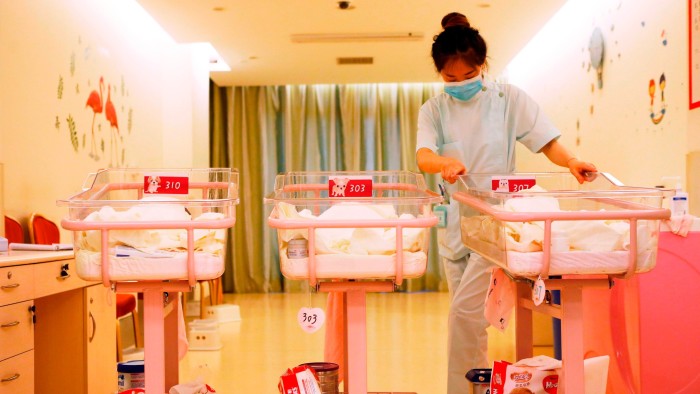Unlock the Editor’s Digest for free
Roula Khalaf, Editor of the FT, selects her favourite stories in this weekly newsletter.
China has stepped up a nationwide campaign to convince single people to date, marry and have children as Beijing grapples with an increasingly severe demographic crisis.
Local governments are cold-calling married women to ask about their plans to have children and are handing out cash to parents to encourage them to have more than one child.
Universities have been asked to introduce so-called love courses for single students, and regular articles appear in state media about the benefits of having children.
China’s population is shrinking, with the number of deaths outstripping births, piling pressure on local governments to address an increasingly bleak demographic outlook.
“China’s population faces three major trends: ageing, low birth and low marriage rates,” said prominent economist Ren Zeping in an interview with domestic press last month. “There are fewer children and more elderly people. The speed and scale of China’s ageing is unprecedented.”
Beijing has pledged to offer subsidies and bigger tax cuts for parents to reduce the cost of raising children. The State Council, China’s cabinet, in October said it was drafting a plan to build a “birth-friendly society” as part of a broader stimulus package to tackle an ailing economy. Details of this plan are still being thrashed out.
In the meantime, married women in their 20s and early 30s across the country have been receiving calls from local officials asking about their plans to start a family, according to multiple people who spoke with the Financial Times and posts on social media.
In some instances, callers asked women to attend prenatal body checks. Other callers were more direct, offering subsidies to women who had more than one child. Couples need to have on average 2.1 children to reach the population replacement rate.
A Zhejiang resident who declined to be named said officials offered local women a Rmb100,000 ($14,000) subsidy for having a second child. “There is no explicit policy, but if you ask for it, the village will find you a way to get you the subsidy,” she said. Currently, subsidies for children are determined by local governments depending on their fiscal health.
The personalised lobbying comes against a background of an intensified media campaign hailing the benefits of childbirth. In recent months, the state-run People’s Daily and Life Times have promoted scientific voices saying childbirth is good for the mother’s health and can even help prevent cancer and treat certain diseases.
A state-run publication by the National Health Commission in December called on universities to set up “marriage and love education courses” to encourage students to couple up.
“Universities are an important place for college students to fall in love,” it wrote, citing a survey that 57 per cent of students said they did not want to get into a relationship due to their heavy workload.
The article proposed that universities introduce courses on the theory of love and real-life case analysis to promote a “systematic knowledge of love and marriage”.
However, experts are sceptical that official measures to bolster the birth rate will persuade young people to start families, especially as rising unemployment and tepid economic growth have reined in spending.
Wang Feng, an expert on Chinese demographics at the University of California, Irvine, said officials were resorting to the same “playbook of using administrative power to achieve demographic goals” that was evident during the one-child policy era, the 35 years from 1980 when families were restricted to having one child.
While Beijing successfully stopped couples from having multi-child families, it is harder to use administrative powers to achieve the opposite result, he said. “Such old wine in a new bottle will not be effective, as the rationale underlying late marriage and low fertility are entirely different.”
Shen Yang, a feminist writer, said people could “see through the propaganda”.
“If the government wants to bolster the birth rate, it should create a more friendly environment for parents, especially single mothers,” she said.
While Beijing is encouraging births, there are no signs that it has limited access to birth control or abortions. Although there may be specific instances of doctors refusing to carry out procedures, these often reflect concern about legal action from family members, said a gynaecologist in Beijing.
Still, Wang said authorities had an uphill battle convincing “young women and men today, who belong to the most educated generation in Chinese history” to have children.
“For young women especially, they not only face high living costs but also severe career penalties when they leave their work position to have children.”
Read the full article here




